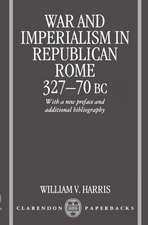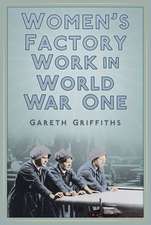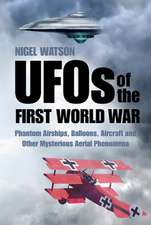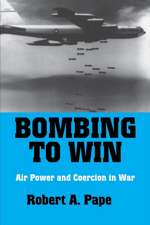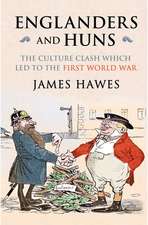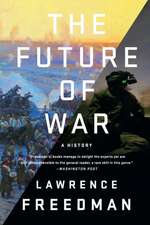The Allure of Battle: A History of How Wars Have Been Won and Lost
Autor Cathal Nolanen Limba Engleză Hardback – 30 mar 2017
Preț: 145.26 lei
Preț vechi: 176.78 lei
-18% Nou
27.79€ • 29.10$ • 22.100£
Carte tipărită la comandă
Livrare economică 26 martie-01 aprilie
Specificații
ISBN-10: 0195383788
Pagini: 728
Ilustrații: 10 b&w illustrations
Dimensiuni: 157 x 239 x 51 mm
Greutate: 1.16 kg
Editura: Oxford University Press
Colecția OUP USA
Locul publicării:New York, United States
Descriere
History has tended to measure war's winners and losers in terms of its major engagements, battles in which the result was so clear-cut that they could be considered "decisive." Marathon, Cannae, Tours, Agincourt, Austerlitz, Sedan, Stalingrad--all resonate in the literature of war and in our imaginations as tide-turning. But were they? As Cathal J. Nolan demonstrates in this magisterial and sweeping work, victory in major wars usually has been determined in other ways. Even the most legendarily lopsided of battles did not necessarily decide their outcomes. Nolan also challenges the hoary concept of the military "genius," even of the Great Captains--from Alexander to Frederick and Napoleon--mapping instead the descent into total war.
The Allure of Battle systematically recreates and analyzes the major campaigns among the Great Powers, from the Middle Ages through the 20th century, from the fall of Byzantium to the defeat of the Axis powers, tracing the illusion of "short-war thinking," the hope that victory might be swift and conflict brief. Such has almost never been the case. Even one-sided battles have mainly contributed to victory or defeat by accelerating erosion of the other side's defenses, resources, and will.
Massive conflicts, the so-called "people's wars," beginning with Napoleon and continuing until the end of World War II, have been more fundamentally determined by prolonged stalemate and attrition, wars in which the determining factor was not tactical but industrial.
Nolan's masterful book places battles squarely and mercilessly within the context of the wider conflict in which they took place. In the process it help corrects a distorted view of their role in war, replacing popular images of "decisive battles" with somber appreciation of the sacrifice and endurance necessary to victory. Accessible, provocative, exhaustive, and illuminating, The Allure of Battle will spark fresh debate about the history and conduct of warfare.
Recenzii
The Allure of Battle provides new and fresh insights into war studies and offers several new and fresh perspectives to look at military history. This is a very well-researched book. Nolan's credentials on the subject are unmatched. It will change the way you have looked at military history up until now. It is a must-read for both students and experts of military history.
In the unusual The Allure of Battle, Cathal J. Nolan seeks to demolish how historians view war - and succeeds surprisingly well... I cannot remember reading anything in the last few years that has made me reconsider so many basic questions - What wins wars? What is the most illuminating way to relate military history? Most important, is our own military too focused on battles and insufficiently attentive to what is required to win wars? In other words, are our generals flailing because they try to substitute battlefield skill for strategic understanding? (I think they are.) Ultimately, Nolan is persuasive that too much attention has been paid to battles.
Nolan suggests that his book is not written for military historians but for the wider public, in part to alert the general reader to the distorted image of the decisiveness in battle. He is too modest: Everyone can benefit from what is a particularly fine history of war.
brilliant


